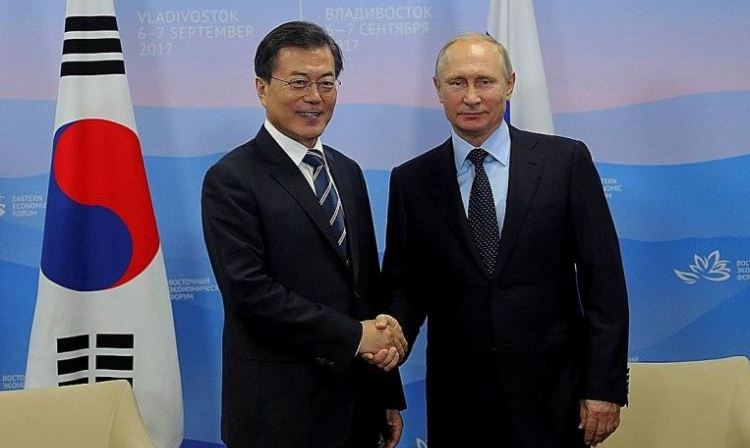
Achieving progress with North Korea is a matter of great importance for US President Trump as the November midterm elections draw near. Finding a solution to a major international problem is a serious challenge no country can manage alone.
Although Washington paints Russia as a villain that can be blamed for whatever is wrong in the world, the US casually overlooks all that propaganda and buckles down to serious negotiations when it needs tangible results. Despite all the differences and tensions, Moscow and Washington are talking turkey in an effort to move forward on North Korea.
US Special Representative for North Korea Stephen Biegun visited Moscow on October 16 to hold working meetings with Russian Deputy Foreign Ministers Igor Morgulov and Sergey Ryabkov. Mr. Biegun accompanied Secretary of State Mike Pompeo on his trip to Pyongyang this month for talks on preparing a second US-N. Korean summit.
On December 22, the UN Security Council adopted Resolution 2397, its sixth on North Korea, imposing more sanctions in response to a ballistic missile test in November. Pyongyang was deprived of $2.3 billion in annual export revenues, or almost everything it received from foreign trade.
Since then, the country cannot import more than 500,000 barrels of oil a year. That’s really harsh. Russia wants the sanctions regime eased as progress is made. The goal of sanctions is denuclearization, not more painful hardships for ordinary people.
A moratorium on nuclear and missile tests is in place, and some key missile facilities, such as the Punggye-ri range in the northeastern region of the country and the Sohae Satellite Launching Station, have been dismantled. In August, the Russian Ministry of Foreign Affairs said it had blocked another US-sponsored resolution.
The fact that it is a nuclear power, a permanent member of the United Nations Security Council, and a neighbor of North Korea with established lines of communication to Pyongyang, makes Russia an effective broker that can make an important contribution.
It has a real interest in a détente on the Korean Peninsula, as Vladivostok, Russia’s gateway to the Asia-Pacific region, is situated just a couple hundred miles from several North Korean nuclear and missile sites.
After all, the demolished N. Korean nuclear test site was located only 200 km from Russia’s border. Moscow has no interest in giving the US a pretext for deploying its missile-defense systems in South Korea and Japan.
Russia is working on its own plans to host North Korean leader Kim Jong Un in Moscow or Vladivostok. No date has been set, and nothing so far has been announced officially, except the fact that an invitation has been accepted by the N. Korean leader.
The Russian daily Izvestia believes a Russian-N. Korean summit will take place before Donald Trump and Kim Jong Un meet each other for the second time. The event is generally expected to take place before the US midterm elections on November 6. The N. Korean leader feels it is important to consult with Moscow before meeting Donald Trump.
Speaking on October 12 at an event in Pyongyang marking the 70th anniversary of the establishment of diplomatic ties between North Korea and Russia, North Korean Foreign Minister Ri Yong Ho said that Pyongyang is seeking to expand ties with Moscow in 2019. He emphasized that his government deeply appreciates Russia’s efforts to promote progress in stabilizing the situation on the Korean Peninsula.
Moscow can offer lucrative economic projects that will make Pyongyang more amenable to dismantling its nuclear and missile programs. The parties are negotiating the construction of a new bridge across the Tumen River that would allow traffic to cross directly, without making a lengthy detour through China.
Gas pipelines could be built to run from Russia to South Korea through North Korea. They could be extended into Japan. Electricity grids could be built along the same route.
Moscow and Seoul are in talks over a deal to deliver 10 billion cubic meters of natural gas to the resource-poor and import-dependent South Korea.
Another project is to restore an old rail link that used to connect South Korea to the Tran-Siberian. “Once the Trans-Korean Main Line is built, it may be connected to the Trans-Siberian Railway. In this case, it will be possible to deliver goods from South Korea to Europe, which would be economically beneficial not only to South and North Korea but to Russia as well,” South Korean President Moon Jae-in said in an interview with Russian media in August.
The North Korean economy is not in such bad shape — not as bad as some describe. The growth rate was 3.7% in 2017, raising its GDP to $29.6 billion in 2018. As market forces emerge, North Korea’s transformation could be accelerated, which would improve the chances of a softening in the international stance.
As stated in a joint communique released by the deputy foreign ministers of Russia, China, and North Korea after their consultations in Moscow on October 10, the United Nations Security Council should reconsider its sanctions against Pyongyang.
“Taking into account the important steps towards denuclearization made by the Democratic People’s Republic of Korea, the sides believe the UN Security Council should start in due time revising the sanctions against the DPRK,” the parties emphasized.
Any agreement that is signed on further progress will need backers. Russia is perfectly suited for this role as it is one of the few nations N. Korea, China, S. Korea, Japan, and other parties can trust. It is an indispensable actor that is taking an active part in the process. Washington is being forced to admit this fact, as the recent visit of Mr. Biegun demonstrates.
ALEX GORKA | SCF
The article was originally published by Strategic Culture Foundation
The 21st Century
